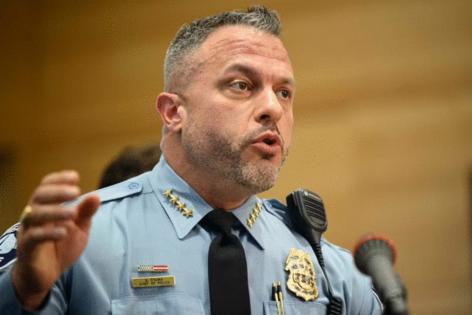One Minneapolis police lieutenant earned about $500,000 last year amid record overtime costs
Published in News & Features
MINNEAPOLIS — The highest-paid Minneapolis police employee earned about a half-million dollars last year, with nearly half of that total from overtime pay.
The city’s Police Department posted a record amount of overtime in 2024: $28 million, or $12 million more than planned.
The department has routinely exceeded its overtime budget to make up staffing shortfalls after a flood of officers left following George Floyd’s murder by police and 2020 and the ensuing unrest.
The force shrank from about 900 officers before Floyd’s death to 560 in the spring of 2024, the lowest in at least four decades.
Police Chief Brian O’Hara said the Internal Affairs Division is investigating at least three officers’ overtime after an audit he ordered of 2024 spending found some officers violated department policy.
Asked in an interview whether some officers worked an implausible amount of overtime, O’Hara paused for a long time and said, “I don’t know what I’m allowed to say, so I don’t get myself in trouble with the city attorney.”
The audit, for example, found cases of officers claiming to have worked too many hours without taking the required eight-hour break in a 24-hour period, O’Hara said.
There’s no cap on overtime pay for officers, only on the number of hours they can work. They must take at least eight hours off every 24 hours — so they are allowed to work up to 16 hours a day.
While Internal Affairs investigates, the officers in question are no longer allowed to work off-duty or earn “double time” pay, O’Hara said. Such investigations take a long time, he said, but he wanted some sort of immediate consequence. So, the chief said, he rescinded those privileges.
“You send a message: You do that to one person, and it spreads like wildfire in the department, and then you wind up getting better compliance,” O’Hara said.
He said he ordered quarterly overtime audits and issued a memo early this year making it clear that supervisors who approve overtime are responsible for assuring subordinates adhere to department policy.
The memo said employees could have their ability to work off-duty side gigs revoked if they violate the policy for such work. It also said employees cannot change a scheduled workday or their scheduled hours in order to work overtime without the chief’s approval.
If supervisors fail to address violations by subordinates, they can be disciplined or demoted. O’Hara said the memo “caused quite a ruckus” among supervisors.
“I couldn’t believe the pushback, even from command staff here,” O’Hara said.
11 police employees made more than $200,000 in overtime last year
Lt. Robert Berry earned more than $295,000 in overtime last year, pushing his total income to around a half-million dollars, according to payroll data.
That’s more than O’Hara, who makes about $300,000 but doesn’t get overtime. It’s far more than Mayor Jacob Frey’s salary of $141,000 and Gov. Tim Walz’s salary of nearly $128,000.
Another big overtime earner was Lt. David Garman, who made nearly $263,000.
Department lieutenants averaged the most overtime: more than $95,000 each.
Some employees made even more: 66 collected more than $100,000, and 11 exceeded $200,000.
O’Hara said Garman “works extremely hard” as one of the leaders of downtown safety, for which he gets “double time,” which is more lucrative than traditional overtime.
“When he’s working late at night, it’s one less thing I have to worry about,” he said.
Garman is a former MPD Officer of the Year who was fired for his role in the seizure of cellphones during a raid but was reinstated in 2010. He was also sued by a family for his part in a raid by the city’s now-defunct Metro Gang Strike Force that led to a city payout of $16,000.
Berry was fired in 2007 for several violations of department policy, including what an assistant chief called a second infraction involving manipulation of time records, after a 2004 investigation found he falsified information to get overtime. He was reinstated by an arbitrator.
Berry was also arrested on domestic assault charges in 2017; the charges were dismissed two years later.
Neither officer could be reached for comment.
A yearslong struggle with staffing since George Floyd
Officers working overtime filled about 40% of shifts last year, O’Hara said.
“That’s just to answer 911 calls and have cops in precincts, because obviously you still have to have some people to investigate homicides and shootings and things,” he said.
Other initiatives are entirely staffed by officers on overtime. They include a juvenile curfew task force and a late-night safety plan where extra police work downtown, in Dinkytown and in the Fifth Precinct.
To help stanch the hemorrhage of officers leaving the department, O’Hara pushed for $18,000 retention bonuses and historic 22% raises, including retroactive back pay, boosting starting salaries for rookies above $90,000 a year — higher than some of the nation’s largest police departments.
The ranks have rebounded, recently passing 600 sworn officers for the first time since 2023. And the police academy has launched its largest class since the 1990s.
The new contract with back pay pushed 35 Police Department employees’ total earnings above $300,000 last year.
Frey said in 2023 that the heavy use of overtime was untenable because officers need time to “recalibrate” between shifts. That year, the department spent $23 million on overtime.
“It’s a fact: Use of force goes up for every hour of overtime,” Frey said. “That’s not because they’re bad people; it’s because they are people."
But overtime spending continued to climb, nearly quadrupling since 2019, the last year before the pandemic and Floyd’s killing.
As staffing goes up, overtime should go down. The city charter requires the employment of 1.7 officers per 1,000 residents, or 731 officers, so that’s the amount budgeted for in this year. But the department has struggled to reach that number.
The savings from being below that threshold are used to cover overtime costs.
Frey said the best way to bring down overtime is by fully staffing the department.
“With a 135% increase in applications and more than 600 officers for the first time in years, we’re making essential progress,” he said.
A Frey spokesperson added, “The mayor is optimistic he will be able to highlight meaningful savings, including on overtime, in his upcoming budget address.”
Overtime juiced by ‘double time’ pay
Part of the reason spending is so high is that in the fall of 2022, the department began paying “double time” — twice its hourly rate rather than the traditional time-and-a-half — or what it calls “critical staffing overtime” to cover staffing gaps.
Double time accounted for about half of the overtime last year.
Officers can volunteer to work shifts that are short-staffed and get double time, or work less desirable assignments, like working when bars close.
Every day, some level of overtime is worked just to staff shifts in all five precincts. In some cases, the overtime is mandatory.
“If you wind up doing more of the canceling days off and ordering people to work mandatory overtime, there’s gonna be less people that want to stay working here,” O’Hara said.
“It works out better if it’s an incentive, and people are volunteering for this stuff more than being ‘volun-told.’”
Double time is a part of the police union contract, which expires at the end of the year.
Paying officers big overtime bucks to cover staffing shortages creates a vicious financial cycle because their pension benefits are based on the average of their five highest-earning years, including overtime. That creates a powerful incentive for officers to leave after five years of record overtime. O’Hara said about 126 people are eligible to retire.
Asked whether he worries about a lot of officers leaving because their pensions would be inflated after five years of high overtime, O’Hara said, “It could (happen), especially if we take this away, and eventually it will go once we get sufficient staffing.”
©2025 The Minnesota Star Tribune. Visit startribune.com. Distributed by Tribune Content Agency, LLC










Comments